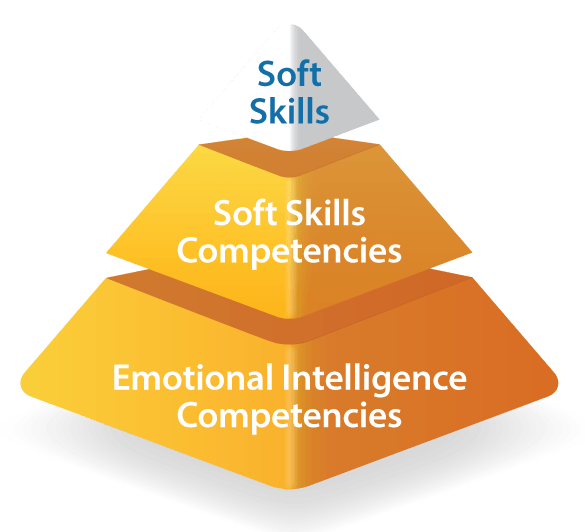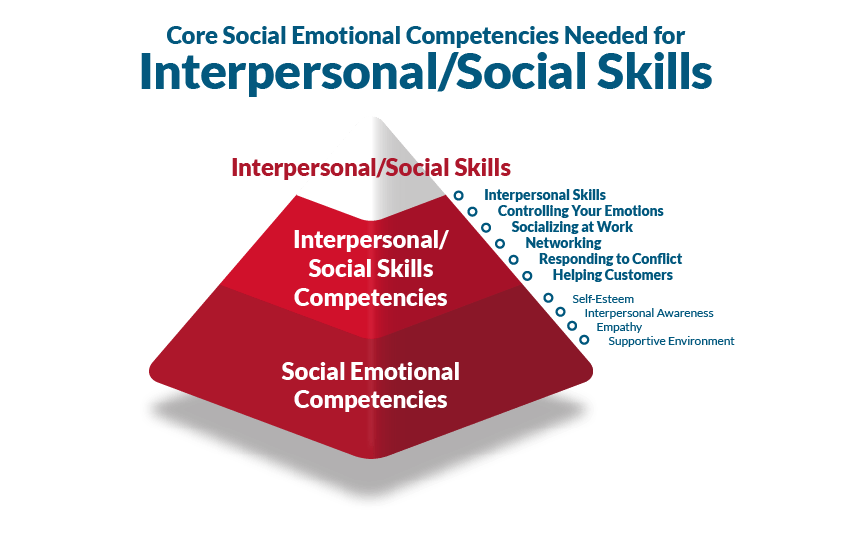A lot has happened in the field of soft skills over the last few years. Awareness of the need for employees to possess soft skills such as attitude, communication, critical thinking, and professionalism, to name a few, has begun to reach a fevered pitch. High school career and technology education (CTE) programs as well as post-secondary institutions have identified the need to offer training in soft skills. Many programs have taken the approach of trying to integrate soft skills training with hard skills training. On the surface, integrating the two sounds like a good idea, however I wonder what the results of such training will provide. The reason for my doubt is that just teaching the concepts of soft skills is not good enough, you have to go deeper.
The Foundation Blocks of Soft Skills
There are hidden skills or competencies that are needed as the as foundation blocks upon which soft skills can be taught. These necessary building blocks are known as emotional intelligence or EQ. EQ is a learned ability to identify, explain, understand and express human emotions in healthy and productive ways. Without these foundation blocks, a learner’s ability to understand and to use soft skills is very limited.
Here is how this works:

In education, the targeted skill being taught is soft skills. The next step is to identify the soft skills competencies that need to be taught. Simple, right? What is missing are the foundation blocks that the soft skills competencies are built upon. Those foundation blocks are EQ competencies.
The foundation blocks of Interpersonal Skills

Interpersonal skills are actually social skills and cover how to interact with other people and present oneself in an acceptable manner. It includes such topics as interpersonal skills, controlling your emotions, socializing at work, networking, responding to conflict and helping customers.
The core EQ foundation skills needed in order to develop these interpersonal skills are self-esteem, interpersonal awareness, empathy and supportive environment.
• Self-esteem is how positively you view yourself. It is a perceived level of personal worth and is the most important EQ competency of them all for developing positive relationships. Contrary to what the current experts say about self-esteem (they think it does not exist), it is a key competency in interpersonal relationships, for it dictates how people might feel about themselves in social situations. If people feel good about themselves, they also demonstrate positive feelings about the others around them.
• Interpersonal awareness first starts with intrapersonal awareness or awareness of self. Once people become aware of themselves they can then become aware of others. Awareness of others also requires a good understanding how others might be responding to them. Many people on the autism spectrum struggle with this concept.
• Empathy is the cornerstone of EQ. Empathy covers how to sense, understand, and accept another person’s thoughts, feelings and behaviors. Empathy is a primary characteristic of skilled communicators and a key aspect in interpersonal or social skills.
• Supportive environment is the extent to which friends, family or peers have impact on an individual’s achievement and how they can positively encourage people in achieving their personal goals and improving relationships.
As you can see here, there is a lot more to the soft skill of interpersonal skills than meets the eye. Remember you cannot teach soft skill competencies while ignoring the underlying necessary EQ competencies.
intra personal skills such as managing the mind , health and happiness is a predominant foundation in building soft skills.
good article.thanks
Merci pour ce très bon billet introductif
All the information which have you shared with us is very useful
thanks for sharing such a nice post
fantastique article Merci pour le partage.
I really like this post
very good article thanks for sharing
Thank for sharing this, I really enjoyed reading it 🙂
Very interesting post. This is my first time visit here. I found so many interesting stuff in your blog especially its discussion. Thanks for the post!
I like to follow your blog, hopefully the better your posts are, so that I am more comfortable to come back next time.
facdroitsp
merci pour vos efforts
Thank you for these informations
Nice post thaanks
Your writing style has been surprised me. Thank you,very nice article.
thanks
I love the article thanks for sharing.